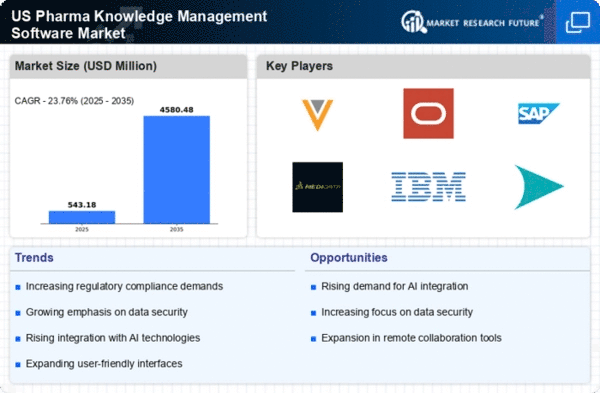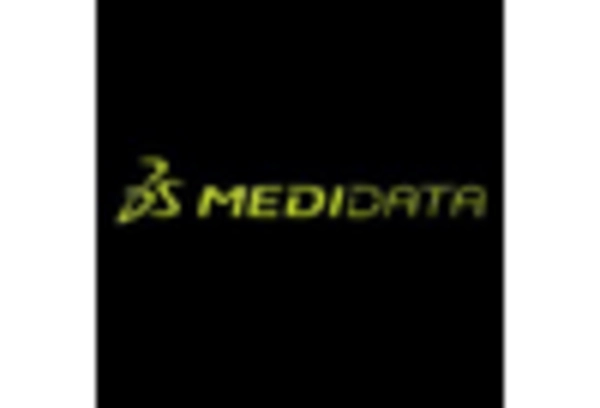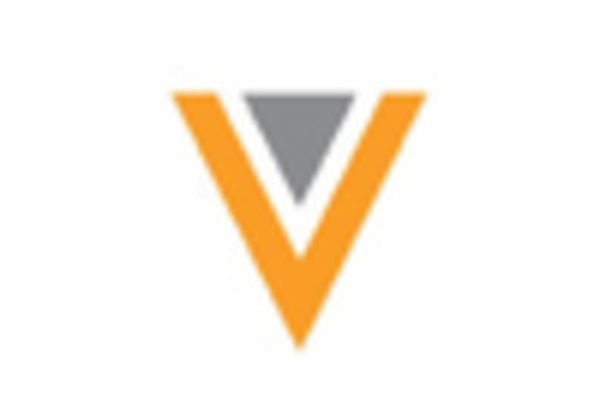Rising Demand for Data-Driven Insights
The increasing emphasis on data-driven decision-making within the pharma knowledge-management-software market is a notable driver. Pharmaceutical companies are increasingly relying on data analytics to enhance their operational efficiency and improve patient outcomes. This trend is reflected in the projected growth of the market, which is expected to reach approximately $2 billion by 2026. The ability to harness vast amounts of data allows organizations to make informed decisions, streamline processes, and ultimately drive innovation. As the industry continues to evolve, the demand for sophisticated knowledge management solutions that can provide actionable insights is likely to intensify, thereby propelling the growth of the pharma knowledge-management-software market.
Regulatory Pressures and Compliance Needs
Regulatory pressures are a driving force in the pharma knowledge-management-software market. With stringent regulations governing drug development and approval processes, pharmaceutical companies must ensure compliance with various standards. The market for compliance management software is anticipated to grow as organizations seek solutions that can help them navigate complex regulatory landscapes. This need for compliance is underscored by the increasing scrutiny from regulatory bodies, which necessitates robust documentation and reporting capabilities. As companies invest in knowledge management solutions that facilitate compliance, the pharma knowledge-management-software market is likely to experience sustained growth.
Growing Importance of Collaborative Research
The trend towards collaborative research initiatives is significantly influencing the pharma knowledge-management-software market. As pharmaceutical companies increasingly engage in partnerships with academic institutions and research organizations, the need for effective knowledge-sharing platforms becomes paramount. Collaborative research can lead to accelerated drug development processes and improved outcomes. The market for collaborative software solutions is expected to grow substantially, driven by the need for seamless communication and data sharing among diverse stakeholders. This collaborative approach not only enhances innovation but also fosters a culture of shared knowledge, which is essential for the advancement of the pharma knowledge-management-software market.
Technological Advancements in Software Solutions
Technological advancements are reshaping the pharma knowledge-management-software market. Innovations in cloud computing, big data analytics, and artificial intelligence are driving the development of more sophisticated knowledge management solutions. These technologies enable pharmaceutical companies to manage vast amounts of information efficiently and derive valuable insights. The integration of advanced analytics tools is expected to enhance decision-making processes and improve operational efficiencies. As organizations increasingly adopt these technologies, the demand for cutting-edge knowledge management software is likely to rise, further propelling the growth of the pharma knowledge-management-software market.
Increased Focus on Intellectual Property Management
Intellectual property (IP) management is becoming increasingly critical in the pharma knowledge-management-software market. As companies strive to protect their innovations and maintain competitive advantages, effective IP management solutions are essential. The market for IP management software is projected to grow at a CAGR of around 12% over the next few years. This growth is driven by the need for robust systems that can manage patents, trademarks, and trade secrets efficiently. By leveraging knowledge management software, pharmaceutical firms can ensure compliance with IP regulations while maximizing the value of their intellectual assets. This focus on IP management is likely to enhance the overall landscape of the pharma knowledge-management-software market.

















